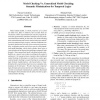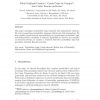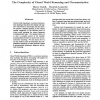257 search results - page 7 / 52 » The Complexity of Model Checking for Propositional Default L... |
LICS
2005
IEEE
14 years 1 months ago
2005
IEEE
Three-valued models, in which properties of a system are either true, false or unknown, have recently been advocated as a better representation for reactive program abstractions g...
SIGSOFT
2003
ACM
14 years 22 days ago
2003
ACM
Model checking is an automated technique for verifying that a system satisfies a set of required properties. Such properties are typically expressed as temporal logic formulas, in...
IJAR
2008
13 years 7 months ago
2008
This paper investigates probabilistic logics endowed with independence relations. We review propositional probabilistic languages without and with independence. We then consider g...
NMR
2004
Springer
14 years 25 days ago
2004
Springer
A logic is defined which in addition to propositional calculus contains several types of probabilistic operators which are applied only to propositional formulas. For every s ∈...
AAAI
1990
13 years 8 months ago
1990
Closed world reasoning is a common nonmonotonic technique that allows for dealing with negative information in knowledge and data bases. We present a detailed analysis of the comp...



